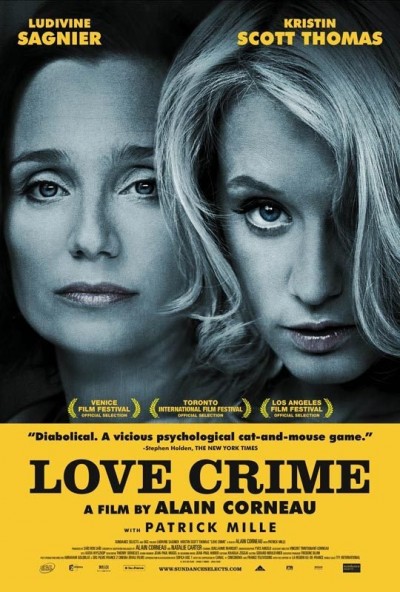
Love Crime is the final film from French director Alain Courneau (best known for the 1991 film Tous les matins du monde), who died last year at the age of 67—and while hardly his best work, it’s a pretty decent swan song with two strong central performances from Ludivine Sagnier and Kristin Scott Thomas. It’s a mystery thriller of a somewhat different kind, since by the 60-minute mark—when the murder occurs—we know whodunit, and the question becomes whether or not it will be gotten away with. At that moment, you realize there’s a twist in there somewhere.
The premise, however, is Mystery 101, which is to say that the murder victim is one of those characters who only exists in mysteries—you know, the person who spends the first section of the film just begging to be murdered. Despite the fact that you’ll know who the victim is going to be early on, I will note now that it’s impossible to discuss the film without a certain amount of spoilers, so you may want to see the film before reading further.
Love Crime is built in a very methodical manner that relies on misdirecting the viewer on the exact nature of what kind of film this is. It opens with high-powered businesswoman Christine (Scott Thomas) and her assistant Isabelle (Sagnier) working into the night on a proposal in Christine’s posh home. Christine is self-assured. Isabelle is not. Christine appears to be in the act of seducing Isabelle—plying her with wine, the gift of a scarf, endearments, caresses, a kiss on the neck. But no sooner does this get underway than Christine’s apparent boyfriend Philippe (Patrick Mille) shows up. Christine beats a quick retreat, but the film never lets on whether this is a relief to her or an intrusion. The same is true with Christine who seems to accept Philippe’s romancing with mixed emotions—or a lack thereof.

It turns out that Christine is—rather transparently to everyone but Isabelle—using Isabelle to help get her dream position with the company in New York. She appears to be giving Isabelle her big chance by sending her to close a big deal in Cairo—a deal, it should be added, that Isabelle’s idea actually sells—and sends (for her own convenience) Philippe off with her. None too surprisingly, Philippe romances Isabelle. Equally unsurprising is Isabelle returning to Paris to find Christine taking credit with the bosses for the idea that sold the project—something Christine explains away as “teamwork.”
And so it goes till Isabelle puts over a deal without Christine’s knowledge. At that point, Christine becomes Isabelle’s tormentor, publicly humiliating her and blackmailing Philippe into romantically humiliating her as well. It’s no big surprise when Christine is murdered. What is something of a surprise is that Isabelle—who has become strung-out on pills—confesses to the murder. But when she detoxes she sets out to prove her innocence. It’s this that provides the movie with its strongest sequences and leads to its primary drama.

The film is not perfect. It takes too long setting things up and establishing even what kind of movie it is. Plus, some aspects of the way the case is handled by the police strain credulity and are clearly done simply to make the plot work. However, the film’s cleverness is undeniable—and it’s not every day that you find two performers like Kristin Scott Thomas and Ludivine Sagnier pitted against each other. For these things, Love Crime is very much worth your while. Not Rated, but contains sexuality, one scene of violence and drug use.




Before you comment
The comments section is here to provide a platform for civil dialogue on the issues we face together as a local community. Xpress is committed to offering this platform for all voices, but when the tone of the discussion gets nasty or strays off topic, we believe many people choose not to participate. Xpress editors are determined to moderate comments to ensure a constructive interchange is maintained. All comments judged not to be in keeping with the spirit of civil discourse will be removed and repeat violators will be banned. See here for our terms of service. Thank you for being part of this effort to promote respectful discussion.